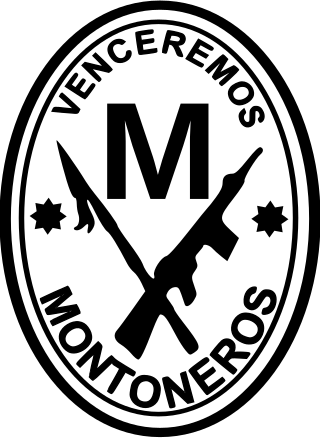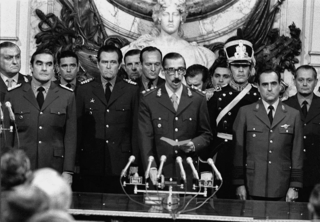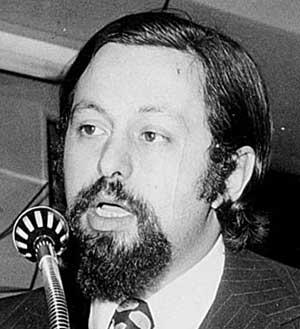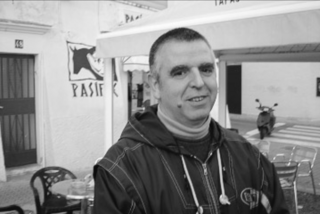Related Research Articles

Montoneros was an Argentine far-left Peronist and Catholic revolutionary guerrilla organization, which emerged in the 1970s during the "Argentine Revolution" dictatorship. Its name was a reference to the 19th-century cavalry militias called Montoneras, which fought for the Federalist Party in the Argentine civil wars. Radicalized by the political repression of anti-Peronist regimes, the Cuban Revolution and socialist worker-priests committed to liberation theology, the Montoneros emerged from the 1960s Catholic revolutionary guerilla Comando Camilo Torres as a "national liberation movement", and became a convergence of revolutionary Peronism, Guevarism, and the revolutionary Catholicism of Juan García Elorrio shaped by Camilism. They fought for the return of Juan Perón to Argentina and the establishment of "Christian national socialism", based on 'indigenous' Argentinian and Catholic socialism, seen as the ultimate conclusion of Peronist doctrine.

Isabel Martínez de Perón is an Argentine former politician who served as the 46th President of Argentina from 1974 to 1976. She was one of the first female republican heads of state in the world, and the first woman to serve as president of a country.

Néstor Carlos Kirchner Ostoić was an Argentine lawyer and politician who served as the President of Argentina from 2003 to 2007. A member of the Justicialist Party, he previously served as Governor of Santa Cruz Province from 1991 to 2003, and mayor of Río Gallegos from 1987 to 1991. He later served as the first ever First Gentleman of Argentina during the first tenure of his wife, Cristina Fernández de Kirchner. By the time he died in October 2010, he was First Gentlemen from 2007, President of the Justicialist Party and National Deputy from 2009, and Secretary General of UNASUR from May 2010. Ideologically, he identified himself as a Peronist and a progressive, with his political approach called Kirchnerism.

The Dirty War is the name used by the military junta or civic-military dictatorship of Argentina for the period of state terrorism in Argentina from 1974 to 1983 as a part of Operation Condor, during which military and security forces and death squads in the form of the Argentine Anticommunist Alliance hunted down any political dissidents and anyone believed to be associated with socialism, left-wing Peronism, or the Montoneros movement.

The People's Revolutionary Army was the military branch of the communist Workers' Revolutionary Party in Argentina.
The Argentine Anticommunist Alliance was an Argentine Peronist and fascist political terrorist group operated by a sector of the Federal Police and the Argentine Armed Forces, linked with the anticommunist lodge Propaganda Due, that killed artists, priests, intellectuals, leftist politicians, students, historians and union members, as well as issuing threats and carrying out extrajudicial killings and forced disappearances during the presidencies of Juan Perón and Isabel Perón between 1973 and 1976. The group was responsible for the disappearance and death of between 700 and 1100 people.
The theory of the two demons is a rhetorical device used in Argentine political discourse to disqualify arguments that appear to morally equate violent political subversion with illegal repressive activities carried out by the state.

José López Rega was an Argentine politician who served as Minister of Social Welfare from 1973 to 1975, first under Juan Perón and continuing under Isabel Perón, Juan Perón's third wife and presidential successor. Lopez Rega exercised an allegedly Rasputin-like power and influence over Isabel Perón during her presidency, and used both this and his unique access to become the de facto political boss of Argentina. His orthodox peronist and far-right politics and interest in the occult earned him the nickname El Brujo. Rega had one daughter, Norma Beatriz, who went on to become the spouse of President Raúl Lastiri.

The Casa Histórica de Tucumán is a historic building and museum located in San Miguel de Tucumán, Argentina, built during the colonial times. The Congress of Tucumán worked in this house during the Argentine War of Independence, and issued the Argentine Declaration of Independence on July 9, 1816. It was nationalized decades later, and partially demolished for its poor condition. It was declared a National Historic Monument of Argentina in 1941, and reconstructed, with simplified details, in its original layout.

Ricardo Obregón Cano was an Argentine Justicialist Party politician. Born in Río Cuarto, Córdoba, he was Governor of Córdoba from May 25, 1973, to February 28, 1974. A left-wing Peronist, he was deposed by a police coup in 1974, which was later backed by Juan Perón.

Horacio Verbitsky is an Argentine investigative journalist and author with a history as a leftist guerrilla in the Montoneros. In the early 1990s, he reported on a series corruption scandals in the administration of President Carlos Menem, which eventually led to the resignations or firings of many of Menem's ministers. In 1994, he reported on the confessions of naval officer Adolfo Scilingo, documenting torture and executions by the Argentine military during the 1976–83 Dirty War. His books on both the Menem administration and the Scilingo confessions became national bestsellers. As of January 2015 Verbitsky is a Commissioner for the International Commission against the Death Penalty.

Funny Dirty Little War is a 1983 Argentine comedy-drama film directed by Héctor Olivera, written by Olivera and Roberto Cossa, based on a novel of the same name by Osvaldo Soriano. It was produced by Fernando Ayala and Luis O. Repetto, and stars Federico Luppi, Miguel Ángel Solá, Ulises Dumont, Héctor Bidonde and Víctor Laplace.

The 1976 Argentine coup d'état overthrew Isabel Perón as President of Argentina on 24 March 1976. While it had some right-wing elements, such as its emphasis on order and security, it was not a traditional right-wing coup and did not adhere to a specific ideology. A military junta was installed to replace her; this was headed by Lieutenant General Jorge Rafael Videla, Admiral Emilio Eduardo Massera and Brigadier-General Orlando Ramón Agosti. The political process initiated on 24 March 1976 took the official name of "National Reorganization Process", and the junta, although not with its original members, remained in power until the return to the democratic process on 10 December 1983. The coup was planned and executed within the framework of the Condor Plan, a clandestine system of repressive coordination between Latin American countries promoted by the United States, as part of the national security doctrine, which generalized dictatorships in Latin America in order to maintain the control over those countries during the Cold War.
David Kraiselburd (1912–1974) was an Argentine journalist, newspaper publisher, and lawyer, best known for his commitment and actions against military regimes and political violence of both right- and left-wing extraction. He was assassinated shortly after the beginning of the Dirty War—in mid-1974—and shortly before the military coup.

Patricia Bullrich is an Argentine professor and politician who is serving as Minister of Security since 2023 under president Javier Milei, having previously held the office under president Mauricio Macri from 2015 to 2019. She is the chairwoman of Republican Proposal.

David Graiver was an Argentine businessman and banker who was investigated in the 1970s for alleged money laundering of US$17 million for the Montoneros, a leftist guerrilla group. He was indicted for embezzlement after his reported death by Manhattan District Attorney Robert Morgenthau, who had thought he might have faked his death, because of the September 15, 1976, failure of American Bank & Trust. This was the fourth-largest bank failure in United States history at the time, and Graiver's banks in Argentina and elsewhere also failed. A New York court declared Graiver officially dead on January 15, 1979, clearing the way for resolution of some outstanding financial issues.

The Trelew Massacre was a mass execution of 16 political prisoners, militants of different Peronist and leftist organizations, in Rawson prison by the military dictatorship of Argentina. The prisoners were recaptured after an escape attempt and subsequently shot down by marines led by Lieutenant Commander Luis Emilio Sosa in a simulated new attempt to escape. The marines forced the prisoners to fake a new escape, then executed them as revenge by the Revolución Argentina for the successful escape of some of their comrades during the initial prison break. The massacre took place in the early hours of 22 August 1972 in the Almirante Marcos A. Zar Airport, an Argentine Navy airbase located near the city of Trelew, Chubut in Patagonia.

Juan Manuel Abal Medina is an Argentine journalist and politician who served as Secretary General of the Peronist Movement between 1972 and 1974. He later became a prominent lawyer in Mexico.

Eduardo Enrique "Wado" de Pedro is an Argentine lawyer and Justicialist Party politician who has served as National Senator since 2023. He previously served as the country's Minister of the Interior from 2019 to 2023, National Deputy for Buenos Aires Province, as member of the Council of Magistracy, and General Secretary to President Cristina Fernández de Kirchner.

Mario Eduardo Firmenich is a former Argentine urban guerrilla leader and politician. He was one of the commanders of Montoneros group and the most significant figure in the Argentine guerrillas in the 70s. In 1987, He was sentenced to life in prison for killing a businessman and attempting to murder multiple politicians in Argentina, but was pardoned by president Carlos Menem in 1990.
References
- ↑ "32 balazos para matar a Mor Roig: el mensaje mafioso de Montoneros que profundizó la violencia política en Argentina". 18 July 2021. Infobae. Retrieved 19 February 2022.
- ↑ Kandell, Jonathan (16 July 1974). "Former Argentine Official Slain As Acts of Terrorism Continue". The New York Times. The New York Times. Retrieved 19 February 2022.